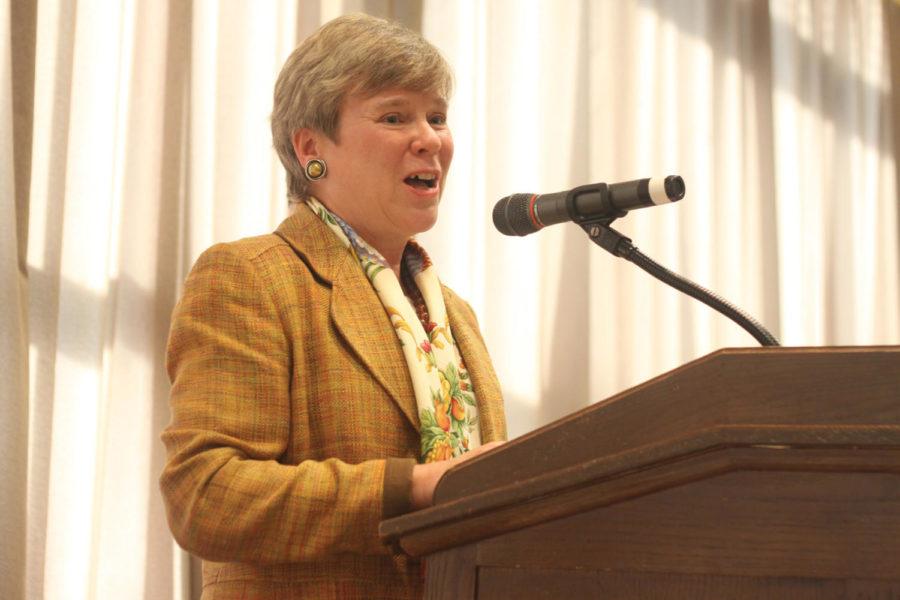Chief U.S. negotiator speaks to students about nuclear arms reduction
Photo: Huiling Wu/Iowa State Daily
Rose Gottemoeller gives a lecture, “Nuclear Arms Control for the 21st Century,” on Nov. 10 in the Sun Room of the Memorial Union.
November 10, 2010
Rose Gottemoeller, Bureau of Arms Control assistant secretary of state and chief negotiator of the New Strategic Arms Reduction Treaty with the Russian Federation in April, stressed the importance of the new generation’s role in the elimination of nuclear arms at her guest lecture Wednesday at the Memorial Union.
“It is imperative that the youth of today recognize the threat that nuclear armaments pose on our lives and that they will be the ones to continue the work necessary to solve it,” Gottemoeller said. “This global problem isn’t going to be solved in my lifetime. It’s up to the next generation to make sure the efforts go on.”
The New START Treaty, if passed by Congress, will reduce the amount of deployed offensive nuclear weapons of both the United States and the Russian Federation to roughly 1,550 missiles, around the same count each nation had during the 1950s. Currently, each nation has 1,700 to 2,200 missiles.
“We’re doing our best to bring this to a vote as soon as possible,” Gottemoeller said. “We believe there is bipartisan support in Congress. The question is simply when it will be put to a vote. All we can say right now is that it’s our highest priority in terms of foreign policy.”
Once a nuclear weapon is dismantled, one of the major problems involved is what to do with the still active nuclear material. Fortunately, Gottemoeller said a lot of those materials are being put to good use.
“Since the first arms reduction treaty back in 1990, we’ve had an outstanding program focusing on taking the nuclear material from dismantled weapons and putting it through a process to make it less volatile, and then using the material as fuel for nuclear power plants,” Gottemoeller said. “We’ve done this both with our dismantled weapons and we’ve worked with Russia on doing the same with theirs.”
While the United States and Russia combined possess roughly 90 percent of the world’s nuclear weapons, there are other nations not currently involved in negotiations. Some of those nuclear countries include Pakistan, India, North Korea and Iran.
“The five permanent members of the United Nations Security Council are the United States, China, Russia, France and the United Kingdom,” Gottemoeller said. “However, there are currently plans being developed to bring in countries outside of those nations. Those nuclear countries like Iran or North Korea are, to put it as best as possible, problematic, and we hope that trying to bring them into the talks will help things.”
Above all, Gottemoeller said the elimination of nuclear arms is a slow, step-by-step process that will take a great deal of time to completely accomplish.
“It may seem like an impossible task, but we’re doing everything we can to make this happen over a gradual period of time,” Gottemoeller said. “Fortunately for everyone, President Obama has reignited the passion for this cause, and it is once again a high priority. We just have to keep in mind that this can’t be done overnight.”

















